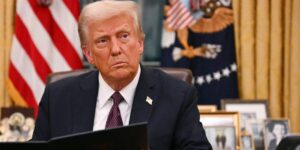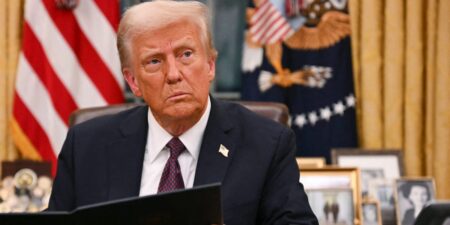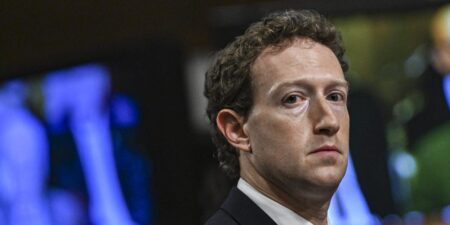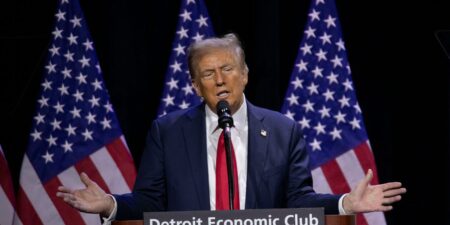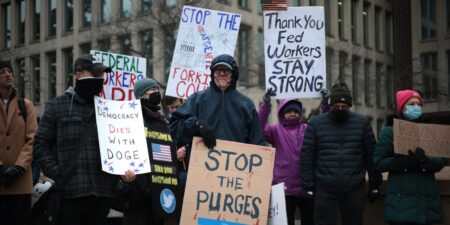- Some fashion brands are pausing influencer campaigns and blaming US tariffs.
- Prominent brands Halara and Shein have temporarily halted some campaigns.
- The moves come after President Trump announced new tariffs on China, Canada, and Mexico.
The trade wars have hit the influencer economy.
Halara, a women’s activewear brand, said it’s pausing some sponsorship campaigns until March, citing concerns around the business impact of new US tariffs, per an email sent to a talent manager and viewed by Business Insider.
Fast fashion retailer Shein informed one talent manager through an agency that it was temporarily pausing collaborative videos. It told another that it was deferring new campaign offers, saying the move was specific to creators with US audiences. In both instances, the company cited the US tariffs as the reason for its pause.
The talent managers spoke on the condition of anonymity to protect their future business dealings. Their identities are known to BI.
Fashion brands that rely on Chinese manufacturing are some of the first to potentially be impacted by President Donald Trump’s tariff policies.
In its email, Halara said it would spend the next few weeks changing its warehouse strategy to adapt to US tariff policy. The company advised its influencers not to shoot any videos before March, as the products they’re meant to promote may have changed by that point.
Halara and Shein did not respond to requests for comment from BI.
Whether the pause impacts some or all of the brands’ US influencer-marketing spending is unclear.
Halara, founded in 2020 by Joyce Zhang, has leaned heavily on social media and influencers to build its business. The company has a big presence on TikTok, where it has sold around 125,000 items through the app’s e-commerce feature, Shop, as of Monday. The company runs an ambassador program for influencers and offers affiliate commissions to creators who boost sales.
Shein similarly leans on creators to drive up sales, sponsoring influencer trips and running an affiliate program offering up to 20% commissions.
Trump, in a February 1 executive order, added an additional 10% tariff on all Chinese goods and a 25% tariff on items from Canada and Mexico. (Tariffs on the latter two countries have been put on pause.)
Trump’s order also removed a duty and tax loophole, known as the de minimis exemption, that allowed brands like Shein and Temu to cheaply send goods to US consumers from China. Last week, Trump delayed removal of the exemption to give the Commerce Department more time to prepare.
Mylen Yamamoto Tansingco, CEO of the influencer talent management firm Clique-Now, said her client’s brand campaigns had not been directly impacted by the tariffs. But she said she’s “anticipating a snowball effect” where increased pricing leads to less consumer spending, which then lowers marketing budgets.
The trade wars may creep into other parts of the creator economy
Influencer marketers aren’t the only ones in the industry bracing for impact.
Creator agency The Network Effect works with a Chinese manufacturer for its Beyond Lost streetwear brand, founded by influencer Alyssa McKay.
Cofounder Brian Nelson said the political back-and-forth poses daily worries.
“Currently we have a pretty big shipment for us on a boat on the way over” via UPS, Nelson said. “If any of this kicks into gear with China, we don’t even know who pays what when it gets here.”
The Network Effect is seeking to diversify its manufacturing partners and plans to eat any immediate tariff-related costs. Nelson said the business “wouldn’t be fine in a long-term scenario” without changes, however.
Canada also remains an open question for the agency — though tariffs are paused — as it marks Beyond Lost’s second-biggest consumer market after the US. (Goods ship from its Chinese manufacturer to the US, and then to Canada upon sale.)
“You have to look at the headlines every day to kind of see where the hockey puck’s moving,” said the Network Effect cofounder Brian Mandler.
If you know more about the recent impact of US tariffs on influencer marketing contact the author at: [email protected] or through the encrypted messaging app Signal (+1 646-768-4720).
Read the full article here





